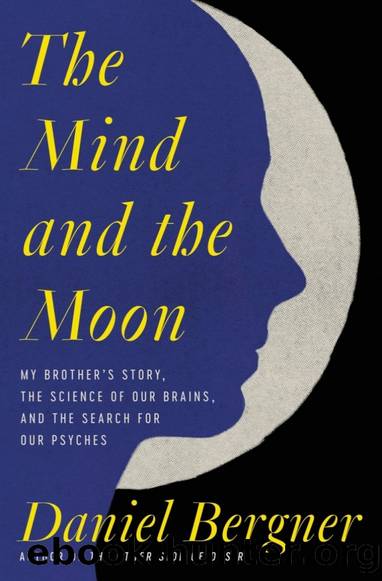The Mind and the Moon: My Brother's Story, the Science of our Brains, and the Search for our Physics by Daniel Bergner

Author:Daniel Bergner [Bergner, Daniel]
Language: eng
Format: epub
Published: 2022-03-19T00:00:00+00:00
Eight
I asked Goff about Carolineâs brain. We had been talking about the hippocampus and its relationship with the prefrontal cortex. He had been teaching me about the differencesâsome hypothetical, some tenuously substantiatedâbetween the brains of those with psychosis and the brains of those who inhabit a more widely shared reality. Our conversation had ventured, as it often did, into questions of how our circuitry becomes our consciousness. For my lesson, he had cued up images of the hippocampus on his computer. He was going to lead me into the intricacies. This was the context of my question about Caroline. I wasnât asking for diagnosis; I was interested in his perspective on possible physiological distinctions. I recounted some of her story, acknowledging that my summary wasnât nearly enough information and that his response would be inherently speculative, and then asked for his impressionistic sense. âWhen you think about her brain, what are you seeing?â
But his reply, in his invariably quiet and compassionate voice, rerouted our conversation. âHas she been tried on clozapine?â It seemed that he hadnât heard me. His mind had leapt to medication, to a particular antipsychotic, the first of the second-generation drugs, the one that appeared to have the best odds of diminishing psychotic symptoms but that also, beyond the side effects of weight gain and permanent disorders of movement, dangerously depleted the immune system. His mind went not to her brain; rather, it felt to me, he went straight to the attempt to purge or contain.
Has she been tried onâthe phrase sounded tangled. It was telling. I felt that he was well outside Carolineâs brain and mind, that his instinct was to draw a line around them, to bound them, to subdue their aberrations, to prevent their anarchy from spreading. Admittedly, this was merely my own intuition, yet has she been tried on was certainly a striking construction, distinguishable from has she tried. She was the object, not the subject, of the sentence, the recipient, not the one deciding.
I said that although sheâd taken a number of antipsychotic cocktails, sheâd never taken clozapine. I said, too, that although her voices persisted, I doubted she would choose to take anything at this point.
He emphasized that the early onset of her psychosisâin childhood as opposed to late adolescence or early adulthoodâmeant that her case was probably especially severe. Then he returned to clozapine. His language shifted. He did make her the grammatical subject now. But he didnât seem to fully take in what Iâd said about her not being interested in resuming medication. He evinced no curiosity about that. Was she coping? How well or poorly? He didnât pause to ask how this severe case was doing without antipsychotics. âSomeone like her will not know the potential benefit of clozapine unless she tries it,â he said. âMy recommendation is often to try it for three months. It does have some side effects. But only then can you really make a decision about what life might be, free of the voices and free of the paranoia.
Download
This site does not store any files on its server. We only index and link to content provided by other sites. Please contact the content providers to delete copyright contents if any and email us, we'll remove relevant links or contents immediately.
Rewire Your Anxious Brain by Catherine M. Pittman(17608)
Talking to Strangers by Malcolm Gladwell(11928)
The Art of Thinking Clearly by Rolf Dobelli(8882)
Mindhunter: Inside the FBI's Elite Serial Crime Unit by John E. Douglas & Mark Olshaker(7863)
Becoming Supernatural by Dr. Joe Dispenza(7131)
Change Your Questions, Change Your Life by Marilee Adams(6675)
The Road Less Traveled by M. Scott Peck(6661)
Nudge - Improving Decisions about Health, Wealth, and Happiness by Thaler Sunstein(6651)
The Lost Art of Listening by Michael P. Nichols(6497)
Enlightenment Now: The Case for Reason, Science, Humanism, and Progress by Steven Pinker(6426)
Win Bigly by Scott Adams(6334)
Mastermind: How to Think Like Sherlock Holmes by Maria Konnikova(6265)
The Way of Zen by Alan W. Watts(5818)
Daring Greatly by Brene Brown(5669)
Grit by Angela Duckworth(4754)
Big Magic: Creative Living Beyond Fear by Elizabeth Gilbert(4745)
Men In Love by Nancy Friday(4355)
Flow by Mihaly Csikszentmihalyi(4072)
The Four Tendencies by Gretchen Rubin(4036)
